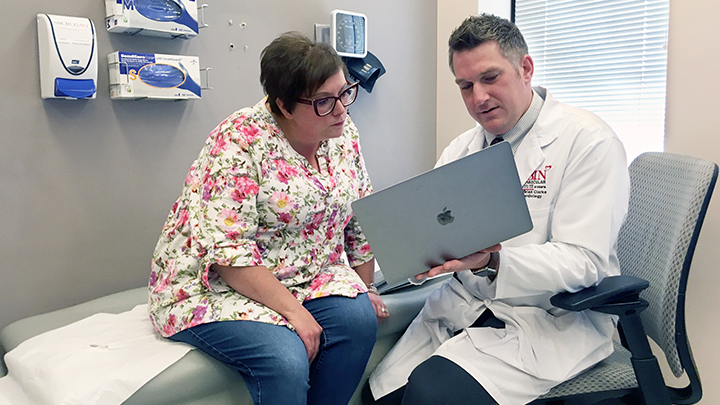
July 23, 2019

Heart failure patient and CardioMEMS recipient Michelle Kotelko reviews her lung pressure readings with cardiologist Dr. Brian Clarke at the Foothills Medical Centre (FMC). Kotelko is participating in a pilot study at FMC, led by Dr. Clarke, on the efficacy of this tiny wireless device.
Story & Photo by Blain Fairbairn
Advanced technology being used at Foothills Medical Centre (FMC) aims to help heart failure patients like Michelle Kotelko stay out of hospital and enjoy a better quality of life.
The Calgary teacher was born with a rare heart defect and underwent surgery at age five to correct a misshapen aorta. She had heart surgery again in 2015 to replace a damaged mitral valve and was hopeful her cardiac issues were resolved. Unfortunately, that wasn’t the case.
Her recovery from surgery was poor and for the next few years she suffered from shortness of breath, pain throughout her body, bloating and a debilitating feeling of pressure in her head and face.
“I couldn’t even walk from my classroom to the car after a day’s work, or around the block with my family without being short of breath and in physical agony,” says Kotelko, 34.
She was referred to Dr. Brian Clarke, a heart failure specialist at FMC and member of the Libin Cardiovascular Institute of Alberta. After an angiogram, he diagnosed Kotelko with heart failure, a chronic condition in which the heart doesn’t pump blood efficiently.
Heart failure can have many causes and results in a stiff heart or weakened heart muscle. The condition can affect people of all ages, leading to fluid retention, shortness of breath, bloating, swelling and fatigue.
“The biggest thing with heart failure is you’re always playing catch-up,” Kotelko says. “Your symptoms get bad, you call the doctor and get prescribed more medication or new medication and then feel better—but after a while, you start to feel worse and the cycle starts all over. It’s a never-ending game of cat and mouse.”
Dr. Clarke says the condition not only frustrates patients, it’s also very taxing on the healthcare system.
“Managing heart failure can be complex because treatment can be highly individualized,” he says. “It’s a very expensive condition to treat, with hospitalizations costing up to $1,800 per day and the average patient staying in care for approximately 10 days.”
That’s when he offered Kotelko the opportunity to be part of a clinical pilot program and research study with the University of Calgary to measure the effectiveness of CardioMEMS, a tiny wireless sensor just millimetres in size that’s implanted into the pulmonary artery of a heart failure patient during a 30-minute procedure.
The device measures pressure in the lungs, a key marker of a patient’s heart health. Physicians receive daily reports on a patient’s lung pressure, which allows them to detect early signs of deteriorating cardiac health. Clinical trials in the U.S. have shown the sensor has reduced by half hospitalizations due to heart failure.
Dr. Clarke became the first physician in Western Canada to implant CardioMEMS in a patient with heart failure when Kotelko received her device in September 2018. Since then, he has implanted the sensor in five other patients in the clinical pilot program and research study that will involve a total of 15 patients to the study’s completion in early 2020.
“CardioMEMS allows us to remotely monitor more specific parameters of a patient’s heart failure status,” he says. “It’s an entirely different approach to treatment because it’s proactive—we can implement interventions before patients get sick and end up in hospital, and we can potentially reduce the need for frequent clinic visits, which offers significant benefits for patients and for the healthcare system.”
Within a week of undergoing the procedure, Kotelko’s pain went away thanks to modifications in her treatment plan made possible from data provided by the device. Each morning she lies on a special “pillow” for 10 to 15 seconds while the device in her heart sends data to her physicians at FMC’s Heart Failure Clinic.
“It was a huge break in the clouds,” says Kotelko. “I’m definitely able to do more and enjoy life more because I’m not suffering. It’s just blown the doors off my care because my doctor and I are much more informed about my heart health.”
Dr. Clarke says CardioMEMS could become a game-changer in heart failure management.
“I’ve been excited about this technology since it was in its conceptual phase,” he says. “As a heart failure doctor, you often wish you had this information readily available in your patients who struggle with persistent symptoms despite what you believe is the best treatment for them.”